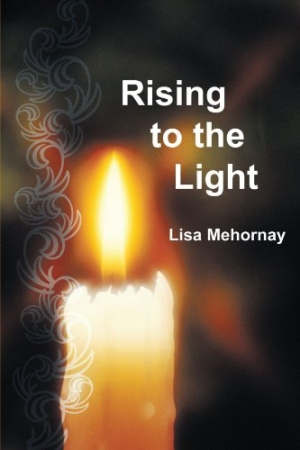Rising to the Light
Both the title and the cover illustration of Lisa Mehornay’s memoir, Rising to the Light, may puzzle readers, who likely will be anticipating a revelatory tale or story of redemption. Mehornay, who has lived in the United States for many years, grew up in Nazi Germany. Those expecting to learn about the details of her life will be disappointed. Her book is neither badly written nor particularly boring, but it is unsatisfying, failing to offer sufficient detail to live up to the promise of its title.
The author’s story of her youth is strangely lacking in emotion. Except for side comments such as, “sometimes I felt deeply sad about the senseless deaths of human beings,” she does not present her young self as a real person living at a time of real horror. Instead, she seems to be a character outside of the story, commenting superficially on what is happening in her own life.
She starts her story in 1936, a young girl of eight who goes by the name Liesl. “The significance of that time and place I didn’t understand,” she writes. “It all seemed normal to me.” Her family is not Jewish, but her father knew that “much persecution of Jews is already taking place,” and he wanted to move the family out of Germany. Her mother refused to leave her home and family tensions arose. “My family was wealthy, and it is only because of the Jews that we are poor now,” she recalls her mother saying, while her father asserts that, “Jews are Germans just like everyone else who lives in our country.” Little of the angst that might be anticipated in such a situation actually makes its way into the memoir.
While discussing the period, Mehornay writes, “I understood something was wrong, something to fear all the time.” Her older brother is forced to join the Hitler Youth in order to stay in school, her father often refers “to all the unkindness and injustice in the world,” and neighbors start disappearing at the hands of the Gestapo. Mehornay insists that “necessity forced me to stop brooding about the situation.”
Her own situation may have been frightening, but the author rarely makes it seem quite that way. She writes that, by 1939, “If I ever had a childhood, it had quickly ended,” yet explanation for this seldom finds its way to the page. One exception is her memory of a cooking class in school: “Since we had no food to cook, that class was taught in theory. It was difficult to deal with reading about food and recipes when you were so hungry.” Poignant and clear, this anecdote hit its mark.
Whether Mehornay’s views on the Nazi regime and the Holocaust are valid is not a question for discussion here. “For a long time, I had known that Jewish people were persecuted, but I did not know about all of millions of murders,” she writes. “Young people would later suffer for what they had not done or been responsible for.” She has obviously distanced herself as much as possible from the horrors of her childhood and has found her own version of peace in religion, which she addresses at length in the book. What she doesn’t address at great length or in detail is her experience growing up in Nazi Germany and how that experience affected her.
Reviewed by
Cheryl M. Hibbard
Disclosure: This article is not an endorsement, but a review. The publisher of this book provided free copies of the book and paid a small fee to have their book reviewed by a professional reviewer. Foreword Reviews and Clarion Reviews make no guarantee that the publisher will receive a positive review. Foreword Magazine, Inc. is disclosing this in accordance with the Federal Trade Commission’s 16 CFR, Part 255.

